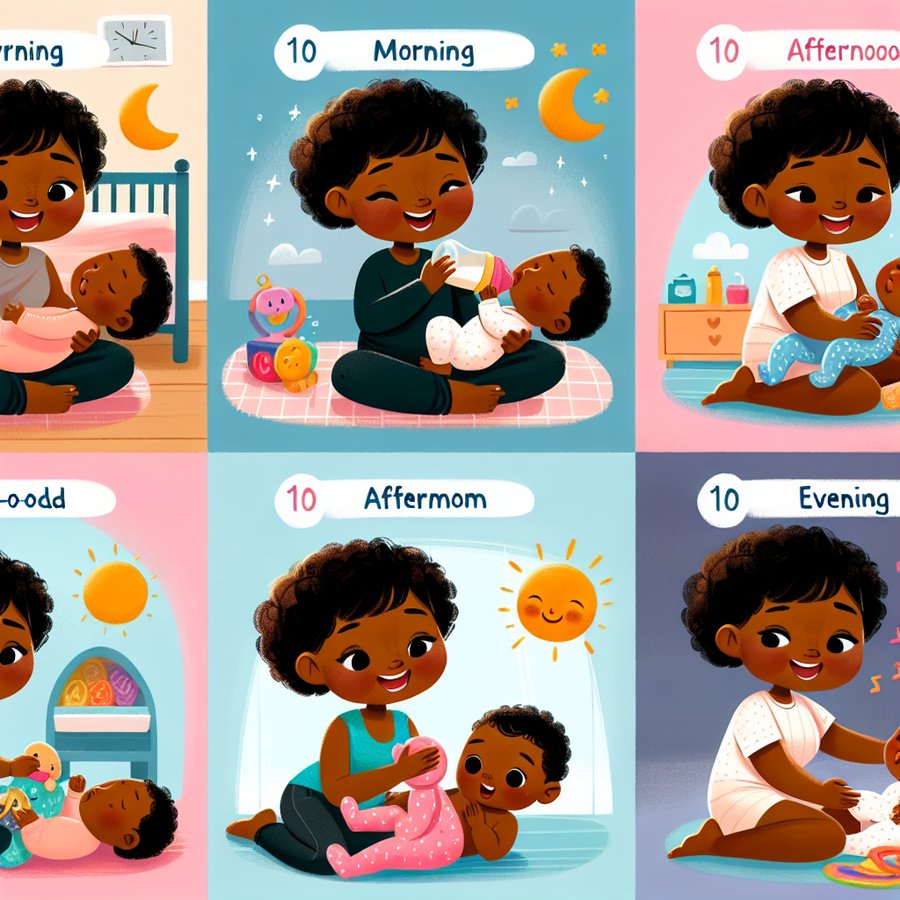Creating a balanced Feeding Schedule for 10-Months-Old Breastfed Baby is crucial for their development and growth. This schedule not only provides the necessary nutrients from breast milk but also gradually introduces them to a variety of solid foods. At 10 months, babies are exploring, learning, and growing at an incredible rate, making it important to support this phase with the right nutrition and feeding times.
Understanding the Nutritional Needs of a 10-Month-Old
At 10 months old, babies are ready to explore a wider range of textures and flavors. Breast milk continues to be a crucial part of their diet, providing essential antibodies, fats, and nutrients. However, this is also the time to introduce more solid foods to meet their growing nutritional needs. It’s important to include iron-rich foods, as recommended by pediatricians, to support their rapid brain development and prevent anemia.
This phase also calls for a variety of fruits, vegetables, grains, and protein sources to ensure a balanced diet. Incorporating foods like soft-cooked vegetables, fruits, cereals, and well-cooked meats into their Feeding Schedule for 10-Months-Old Breastfed Baby can provide the necessary nutrients for their development. Additionally, this is a critical time for babies to develop their fine motor skills and hand-eye coordination, making self-feeding with finger foods an essential part of their daily routine.
Feeding Schedule for 10-Months-Old Breastfed Baby: A Sample Plan
A typical Feeding Schedule for 10-Months-Old Breastfed Baby might look something like this:
- Early Morning: Breastfeed upon waking
- Breakfast: A small serving of iron-fortified cereal mixed with breast milk, alongside soft fruits like banana or pear
- Mid-Morning Snack: A slice of soft-cooked vegetable or a small piece of soft fruit
- Lunch: A variety of mashed or finely chopped vegetables with a small portion of protein (chicken, fish, lentils)
- Afternoon Snack: A small serving of yogurt or soft cheese, if dairy has been introduced
- Evening: Breastfeed before bedtime
This schedule is a guideline, and it’s essential to be flexible as babies’ appetites can vary from day to day. Breastfeeding should continue on demand, as breast milk remains an important source of nutrition and comfort for your baby.
Navigating Challenges in Feeding 10-Month-Olds
Introducing solid foods while continuing breastfeeding can present challenges, such as ensuring your baby receives enough iron and managing potential allergies. It’s important to introduce new foods one at a time and watch for allergic reactions. Resources like Identifying and Managing Food Allergies in 8-Month-Olds can offer guidance during this critical period.
Another common challenge is dealing with picky eaters. Patience and persistence are key. Offering a wide variety of foods and textures, and encouraging self-feeding can help your baby become more open to trying new foods. For additional strategies, consider reading Dealing with Picky Eaters: Strategies for 1-Year-Olds.
Supplementing the Diet of a 10-Month-Old
While breast milk and solid foods cover most nutritional needs, some babies may require additional supplements, such as Vitamin D or iron, especially if they were born prematurely or have shown signs of deficiencies. Consultation with a healthcare provider is essential before adding any supplements to your baby’s Feeding Schedule for 10-Months-Old Breastfed Baby.
Hydration is another critical aspect of your baby’s diet. Alongside breast milk, offering small amounts of water during meal times can help prevent dehydration and promote healthy drinking habits. For more on hydration needs, refer to How Much Water Should a 6-Month-Old Drink Daily.
In conclusion, creating a balanced and flexible Feeding Schedule for 10-Months-Old Breastfed Baby is key to supporting their growth, development, and exploration of new foods and textures. By offering a variety of nutritious foods, encouraging self-feeding, and being attentive to their needs and preferences, you can help lay the foundation for healthy eating habits that last a lifetime.













